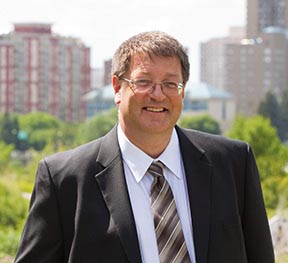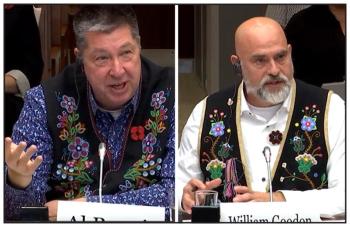Image Caption
Summary
Local Journalism Initiative Reporter
Windspeaker.com
Diverging views on the proposed Métis self-governance legislation Bill C-53 prompted one member of Parliament with the Standing Committee on Indigenous and Northern Affairs to ask why there is such divisiveness among Indigenous peoples.
“It seems like (the bill) is bringing about a lot of resentment and division and this bothers me. It saddens me… I want to encourage you to lean towards solidarity as Indigenous people,” said Nunavut NDP MP Lori Idlout, who is Inuk.
The committee meeting Nov. 7 was one of a handful held on the Bill, with more than a dozen witnesses who either supported C-53, which gives official recognition to certain Métis governments in Alberta, Ontario and Saskatchewan, or who wanted to see the Bill scrapped.

That divisiveness is not unexpected when context is considered, said legal counsel Jason Madden, who for the past 20 years has argued cases for Métis in courts in Ontario and in the Prairie provinces, as well as in the Supreme Court of Canada.
Madden, who himself is Métis, appeared before the Standing Committee that day, as did representatives from the Manitoba Métis Federation. They stood on opposing sides of Bill C-53.
Colonization, said Madden, imposed the racist Indian Act on First Nations people, which they are now only “digging themselves out from under.” Métis, on the other hand, were completely ignored with the hope “you’ll go away or get absorbed into the body politic,” he said.
“(Métis) are finally coming into finding our place in Confederation and we don't have the baggage and the racist legislation of the past holding us back. I get it. I understand that. You can see…that division is not of our own making, though, as Indigenous peoples. It’s because of the history of Canada that has created this situation,” said Madden.
Also spurring that division, he said, was a misunderstanding of the proposed legislation or straight-out misinformation.
Bill C-53 creates a legislative framework for future self-government treaties for Métis Nations of Alberta, Saskatchewan and Ontario.
This approach is not unique, said Madden, who pointed to the Yukon Indian Self-Government umbrella agreement that was signed in 1994.
When the umbrella agreement was signed, that agreement saw only four Yukon First Nations have settlement agreements in place. Any other Yukon First Nation that would ratify a settlement agreement after that initial signing needed only an order-in-council to be brought under the umbrella agreement. The individual First Nation settlement did not go back to Parliament for ratification.
Bill C-53 states that any treaties negotiated by the three Métis governments require only an order-in-council for approval. Those treaties do not go back to Parliament for ratification.
The Yukon model, said Madden, was not contentious and was seen to meet the needs of the Métis Nations of Alberta, Saskatchewan and Ontario, and that was why it was replicated in the case of Bill C-53.
Madden also asserted that Bill C-53 is for self-governance only and, as such, consultation with other Indigenous nations is not warranted. However, he said consultation will be triggered in the negotiation of the treaties “if those treaties have the potential to adversely affect another Indigenous groups’ rights… Canada is being clear that if, in those future negotiations, consultations need to be had.”
But there is nothing in Bill C-53 itself, or in the self-government and implementation agreements signed between the three Métis Nations and the federal government in February 2023, that deal with land.
The Standing Committee has heard testimony from First Nations leaders in Ontario, Manitoba, Saskatchewan and Alberta of their concerns that Bill C-53 is paving the way for access to land and resources in First Nations’ territory.
Chiefs contend there can be no self-government without land and resources.
And First Nations don’t stand alone in their opposition.
Al Benoit, chief of staff and senior advisor with the Manitoba Métis Federation (MMF), raised concerns that Bill C-53 provided no limitations on the content of future treaties.
“There's nothing that says that this legislation is about land, but it doesn't say it's really about citizenship. It doesn't say it's about governance structure. It doesn't say it's about elections. It's completely silent in the legislation,” said Benoit.
Métis Nation of Ontario (MNO) President Margaret Froh has insisted in previous interviews with Windspeaker.com, that Bill C-53 only focuses on citizenship, electing leaders, other core governance areas, and “how we take care of our children.”
“These possible future treaties,” said Benoit, “they’re blank sheets of paper, and what C-53 does is give the executive and these three groups unrestricted pens with which they can write new constitutional instruments, or treaties, but unrestricted…. Put some lines on the page… so we know what is being coloured in.”
He was also concerned that the treaties didn’t have to go back to Parliament for debate and approval.
Citizenship was an issue raised by Will Goodon, minister of housing for MMF.
“There is only one historic Métis Nation,” said Goodon, and it is from here that Métis ancestry flows from shared culture, language, kinship and political action.
Goodon’s definition of the Métis Nation has the provinces of Alberta, Saskatchewan and Manitoba in their entireties comprise the historic Métis Nation homeland, while only parts of British Columbia, the Northwest Territories, Ontario and the northern United States are included.
However, in 2017, the MNO worked with Ontario to include six additional historic Métis communities in the province. The inclusion was controversial within the members of the Métis National Council (MNC), the organization to which the Métis governments of Ontario, Manitoba, Saskatchewan, Alberta and BC belonged.
In 2021, MMF left the national council over the issue of the new Métis communities in Ontario, which remain unresolved today. An expert panel began this year to investigate MNO’s claims to the six communities.
“The question of identify theft. When signing and legislating a treaty, Canada needs to ask itself who is it treatying with?...Who does the MNO represent? It is not the historic Métis Nation,” said Goodon.
Métis ancestry was also a concern raised by Ontario chiefs earlier in the month when they met with the Standing Committee. Read that story here: https://windspeaker.com/news/windspeaker-news/first-nations-appearing-standing-committee-come-out-hard-against-metis-self
Leaders said MNO was claiming Anishinaabe ancestors as Métis ancestors. Chiefs said their Elders had no recollection of sharing territory with Métis communities.

Ken Coates, chair of the Indigenous Governance Program at Yukon University, told the Standing Committee that, in his experience, one Indigenous group should not be consulted on another Indigenous group’s rights.
However, there were other concerns that could be and should be addressed.
He said the issue of identity that has been raised should be dealt with ahead of time, as “they have caused enormous difficulties in other jurisdictions. So when people flag these things as issues to be addressed, we're called to deal with them,” said Coates.
Windspeaker is owned and operated by the Aboriginal Multi-Media Society of Alberta, an independent, not-for-profit communications organization.
Each year, Windspeaker.com publishes hundreds of free articles focused on Indigenous peoples, their issues and concerns, and the work they are undertaking to build a better future.
If you support objective, mature and balanced coverage of news relevant to Indigenous peoples, please consider supporting our work. Whatever the amount, it helps keep us going.

